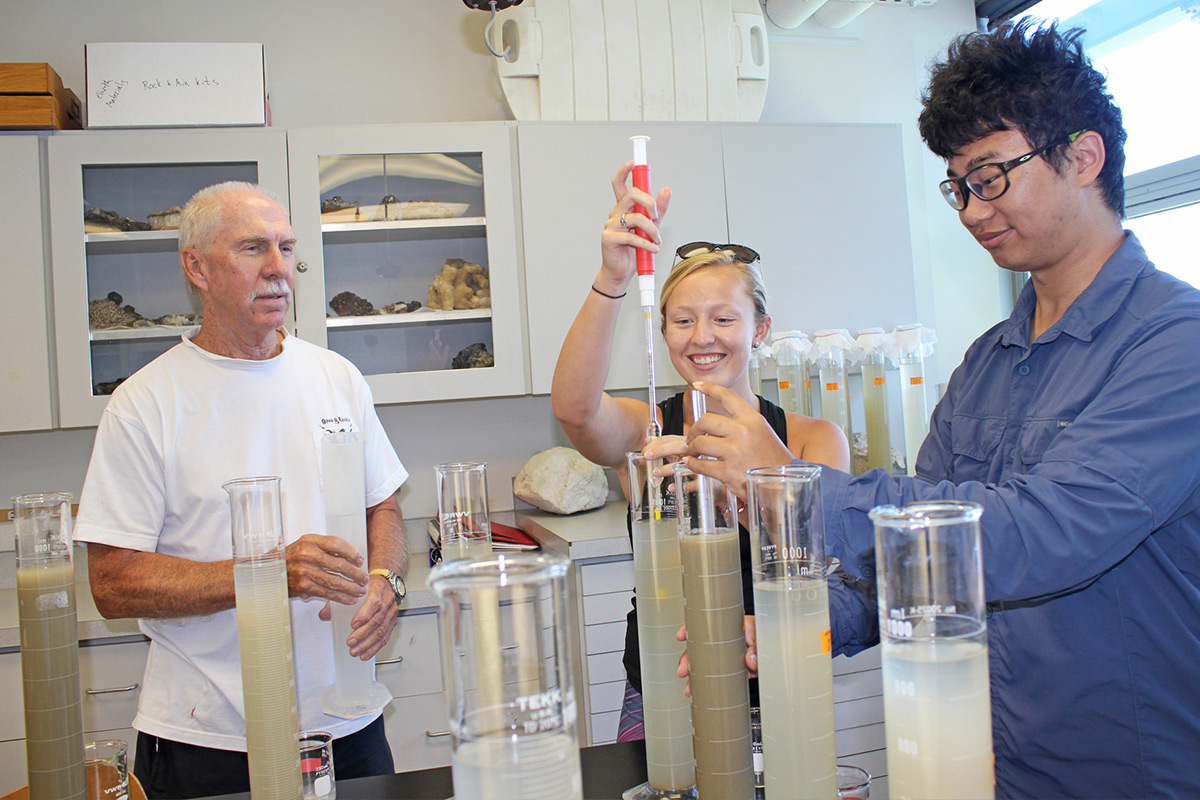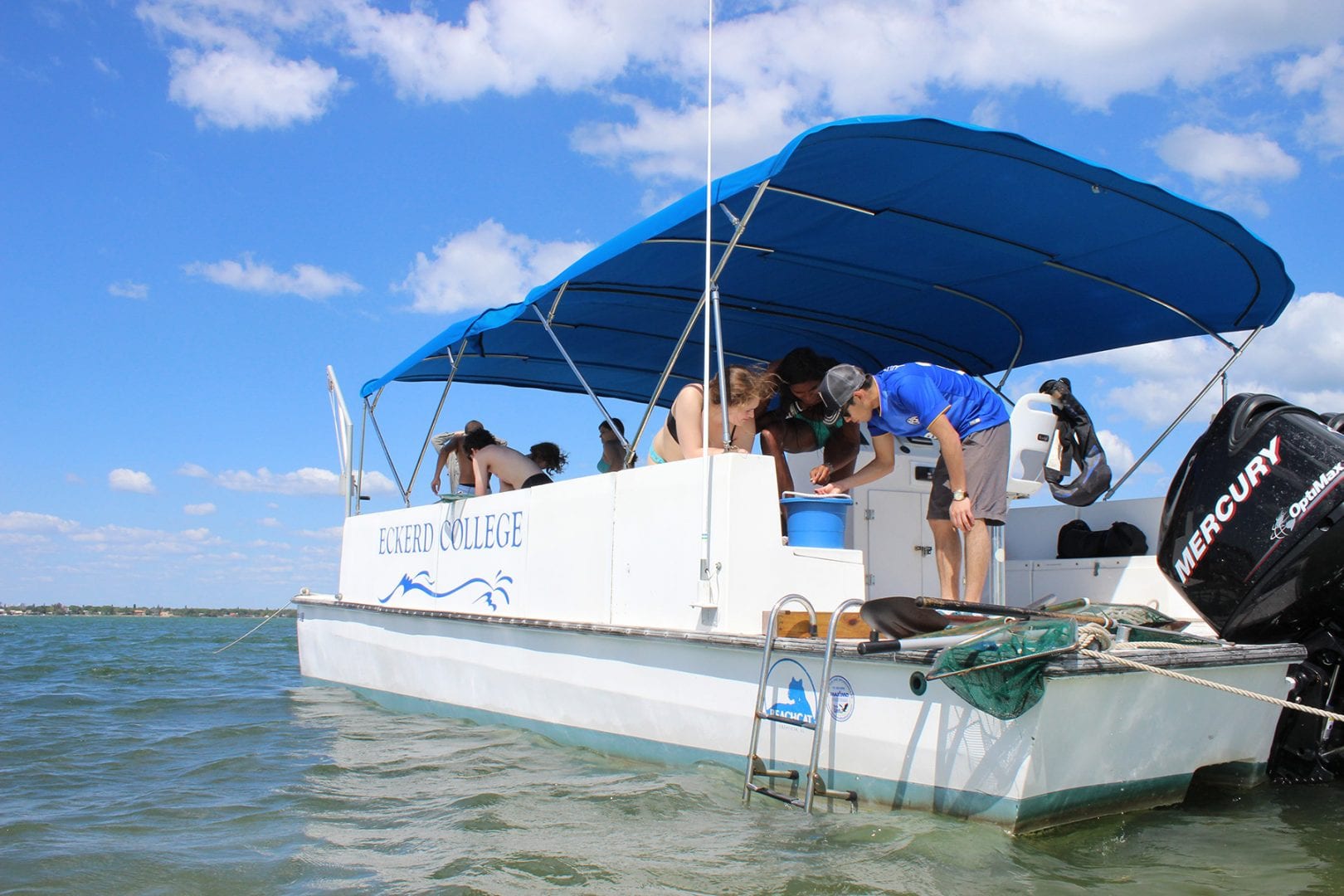Our modern research and teaching facilities, including the Galbraith Marine Science Laboratory (GMSL), were designed primarily to expose undergraduates to active and creative learning and research experiences. In addition, the marine science program has an active fleet of vessels docked at the Eckerd Waterfront, which allow direct and easy access to a wide variety of coastal environments and the open Gulf of Mexico.
Galbraith Marine Science Labs
Our modern and well-equipped facilities at the Galbraith Marine Science Laboratory (GMSL) provide students with opportunities to work with field and laboratory equipment to study and explore marine and coastal environments. GMSL houses a state-of-the-art auditorium, several laboratory classrooms, outdoor classrooms, and computer laboratory. A continuous flow-thru sea water system pumps seawater directly from Tampa Bay into classroom sea tables, labs, faculty offices, and large tanks beneath GMSL allowing marine organisms to be maintained for courses and research for extensive periods of time. Additionally, the marine science program maintains PCs and Macs with scientific software for use by students and in courses.
Research laboratories include:
- Aquarium Room
- Geochemistry Lab
- Sedimentology Lab
- Short-lived Radioisotope Dating Lab
- Core Storage Facility
- Microscopy Lab
- Molecular Lab
- The Keck Lab (dedicated exclusively to student research)
Associated science buildings on campus house other advanced instrumentation and equipment including a DNA sequencer, UV visible spectrophotometer, freezers, incubators, and much more. Students can utilize these instruments for courses and projects. Armacost Library allows students access to scientific journals and databases.

Research Vessels
The Eckerd College campus is situated on lower Tampa Bay, allowing easy access to Tampa Bay and the Gulf of Mexico, including a wide variety of coastal environments. This diversity of coastal environments is easily accessible by our active fleet of vessels, which include three offshore powerboats, and a 23’ catamaran with a working deck.
- The Beachcat is a 32’ catamaran that features an open “working deck” that can easily seat 30+ passengers (an entire class) The vessel is primarily used for laboratory activities for courses such as collecting samples/specimens for study.
- A 24′ Cape Horn center console power boat is used for coastal and offshore research (up to ~20miles) for up to 6 students including snorkeling/scuba diving, sample/specimen collection and field activities.
- A 19′ center console power boat is used for coastal and bay sample/specimen collection and field activities requiring a shallow water boat.
- An 18’ Cape Horn center console power boat is used for coastal and bay sample/specimen collections and field activities including the Eckerd College dolphin project.

Waterfront Program
Eckerd College Waterfront Program provides dockside facilities to harbor the marine science vessels. Located on Frenchman’s Creek, facilities include the Wallace Boathouse, an Activities Center, multiple docks and a boat ramp. In addition to the marine science vessels, canoes, sea kayaks, and snorkel equipment are readily available and regularly used in marine science courses.

Florida Institute of Oceanography Membership
As a member of the Florida Institute of Oceanography (FIO) Eckerd College, faculty, students and courses utilize the research facilities and vessels operated by FIO. This includes a full day research cruise for students enrolled in the Chemical and Physical Oceanography course aboard one of the FIO’s oceangoing research vessels, the R/V Weatherbird II or the R/V Hogarth, to collect oceanographic data on Tampa Bay’s marine environments. Students also periodically serve as scientists on grant-funded research cruises with FIO and other vessels in the Gulf of Mexico, Atlantic, Pacific, and Caribbean. Student participation on research cruises often leads to continued involvement in research projects.
R/V Weatherbird II
The Research Vessel (R/V) Weatherbird II is 115-feet in length and her mission is to provide a seagoing platform for oceanographic and marine science education and research at sea. She has accommodations for a ship’s crew of seven and a science party of 13 for up to about two weeks at sea, but can accommodate larger research parties for educational day cruises. The ship includes working deck space, wet and dry laboratories, with a range extending throughout the Gulf of Mexico, Caribbean, and parts of the Atlantic. Its home port is located in nearby Bayboro Harbor at the University of South Florida (USF) College of Marine Science, St. Petersburg campus.
R/V Hogarth
The R/V Hogarth is Florida Institute of Oceanography’s state-of-the-art Research Vessel, with Eckerd College as a contributing member toward its construction. Named after Dr. William T. Hogarth, the 78-foot “floating laboratory” has accommodations for about one to two weeks at sea for a ship’s crew of give, a science party of 10, as well as wet and dry labs on board.
Keys Marine Lab
The Keys Marine Laboratory is a full-service marine field station situated in the Florida Keys and offers a unique opportunity for college level education and researchers. Its location provides easy access to Florida Bay, the Everglades National Park, and the Florida Keys National Marine Sanctuary, and offers an excellent base of operations for field excursions.





